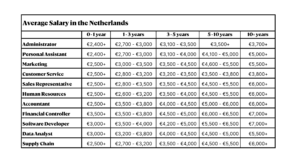Imagine you’ve just received an excellent job offer. Successful company, exciting role, perfect location. The only thing left to agree upon is the salary. How can you answer the question about your salary expectations when you are unfamiliar with the Dutch job market and the appropriate salary for a position in the Netherlands?
There are many factors to consider when deciding what salary you should expect, including your age, education, relevant experience, specific skills, exact position and responsibilities, as well as the company’s size and industry sector. We have compiled some of the most important information you need when entering into salary negotiations with a prospective employer.
Please note that salaries in the Netherlands are usually quoted in terms of monthly recompense as opposed to an annual salary. If you are provided with an annual amount it is always worth asking whether the amount includes 8% holiday pay or a 13th or 14th-month pay, as salaries are often quoted without these extra amounts and these additions can increase your annual pay considerably.
Average salary range by years of experience and professions
We’ve created a list of average salaries in the Netherlands you can expect for a wide range of occupations and presented them based on years of relevant experience.

These numbers were provided by our recruiters who have extensive experience with salary expectations over a wide range of fields and levels of experience, as well as using publicly available information.
Skills and languages
Developing specific skills can lead to financial rewards in the Netherlands. AI Engineers and IT professionals are in high demand, as are leadership roles and highly specialized engineering positions. Of course, developing soft skills such as creativity, persuasion and collaboration will give you an advantage since many employers currently consider these to be desirable skills. Moreover, many international companies are based in the Netherlands so there is a high demand for native speakers who can conduct business with partners abroad. If you are an expat looking for a job in the Netherlands, English is a must. However, the most in-demand languages are German and French since the Dutch trade mostly focuses on neighbouring countries.
Minimum wage and the average monthly salary
The minimum wage in the Netherlands as of January 2026 is €14.71 gross per hour for persons 21 and older. The required minimum salary is lower for younger workers.
The average monthly salary in 2026 is predicted to reach €3,800 gross per month, and the yearly average salary €48,000.
Calculating your salary after taxes
Although salaries are relatively high in the Netherlands, income tax levels are correspondingly high and they depend on your household and work income. Estimating roughly – an employee who earns €2,500 gross salary should take home around €2,200 net.
- The tax rate for a person earning a yearly salary below €38,883 gross is 35.75%
- The tax rate for a person earning a yearly salary between €38,883 and €78,426 gross is 37.56%
- The tax rate for a person earning a yearly salary above €78,426 gross is 49.50%
Salaries are usually quoted ‘gross’ (before tax subtraction) when negotiations are underway but, of course, what you are really interested in is the net income (i.e. what will go into your bank account at the end of the month). You can easily calculate your net salary with this Dutch income tax calculator.
We hope this helps to give you a broad overview of what you can expect to earn in the Netherlands and how much is reasonable to ask for if you are coming from another country. Remember to ensure that when you receive a quote for a salary you are absolutely clear about what it includes and always try to calculate what your net income is likely to be.
Our recruitment agency focuses on matching multilingual job seekers with international companies in the Netherlands. Are you looking for your next career step?






